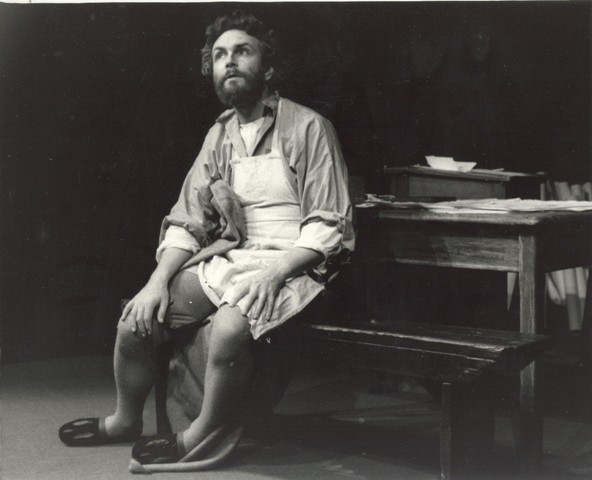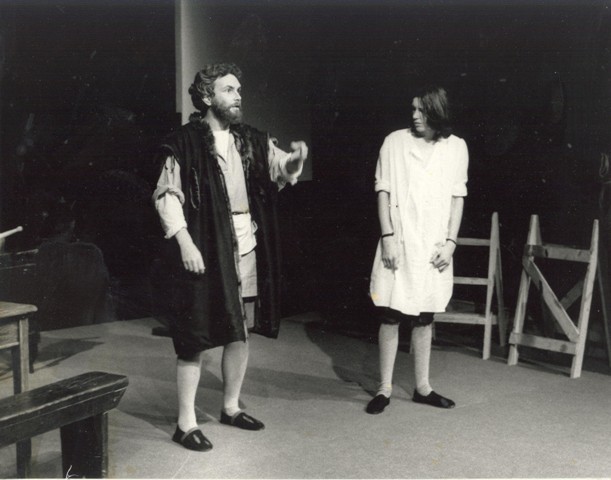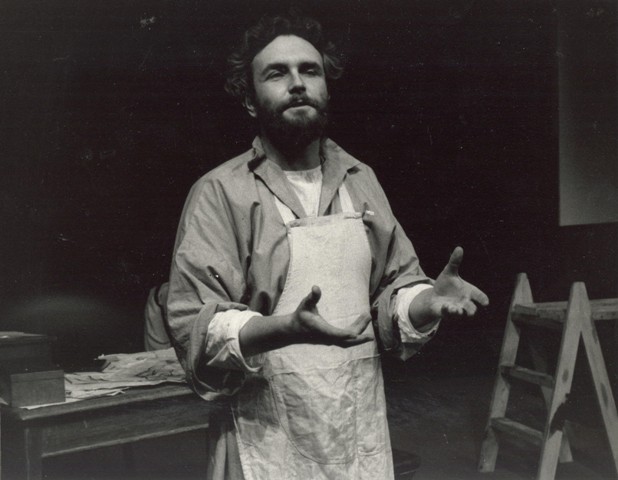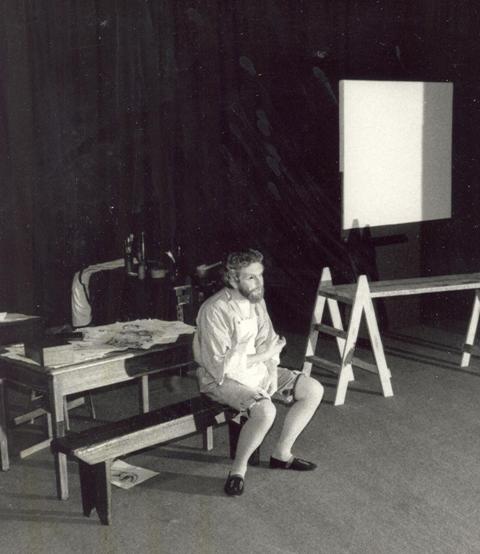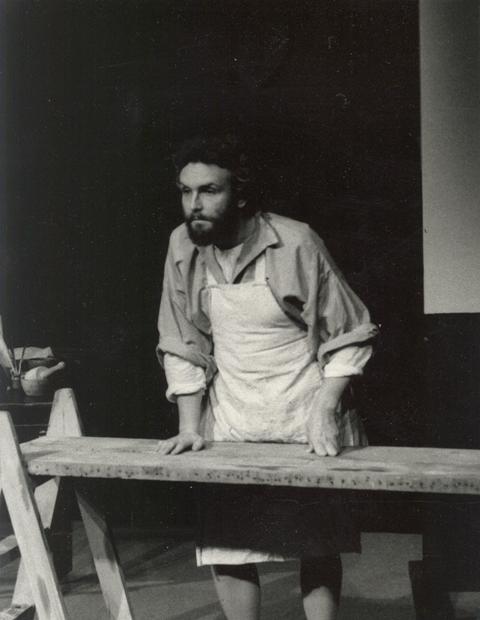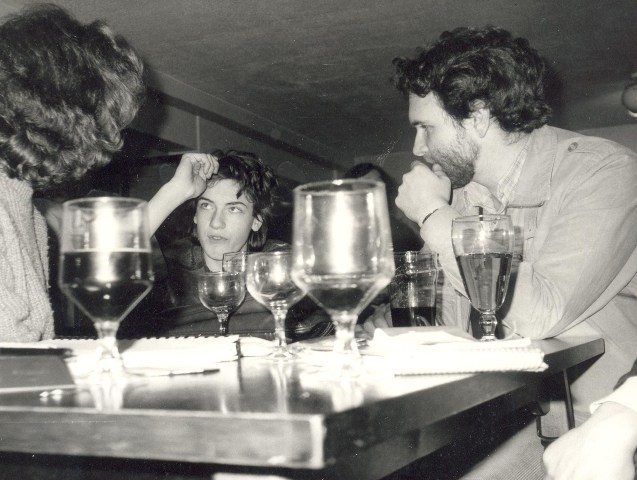The Bench Production
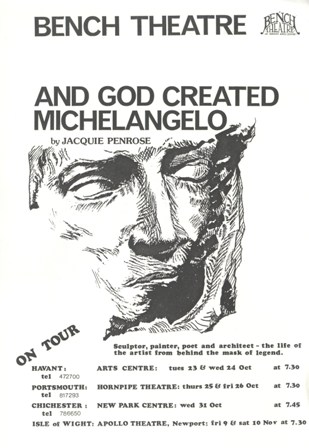
This play was first staged at Havant Arts Centre, East Street Havant - Bench Theatre's home since 1977. It was then taken on tour by the cast and crew to The Hornpipe Theatre, Portsmouth; The New Park Centre, Chichester and the Apollo Theatre, Newport IoW.
At Havant Arts Centre on Wednesday 24th October, the play was followed by rehearsed readings of 'Waiting Gain' by Jean Binnie (Winner of the Short Plays section of the 1984 Bench Playwriting competition) and two other entries: 'Shadows' and 'Your Money or Your Life'.
Characters
| Michelangelo | David Penrose |
| The Assistant | Saul Hewish |
Crew
| Director | Peter Corrigan |
| Stage Manager | Jacquie Penrose |
| Assistant Stage Manager | Richard Stacey |
| Design | Craig Morrison |
| Lighting | Janice Bell |
| Sound | Peter Codd |
| Costume | Jane Hart |
| Set | Peter Codd Janice Bell Karen Caen Bill Bickers Debbie Valentine John Valentine |
| Poster | David Penrose |
| Publicity | Penny Cameron |
Writer's Notes
Michelangelo? Isn't he the one who painted the Mona Lisa? (or was that Picasso?) Something to do with the South Bank Show?... Michael who? A famous name, but there is often little knowledge to support the fame. So why write a play about a long-dead artist? There are several reasons. One is that it is a powerful story that provides an actor with a splendid challenge. Another is that Michelangelo believed that art is life - the evidence that we are human. He believed that God was the supreme artist, who appoints human artists to carry on Hi work on earth. This belief in art as something profoundly human, and therefore profoundly important is one I share, and like Michelangelo, I fear our society is in danger of forgetting it.
Michelangelo lived through difficult times; wars of mass destruction were becoming commonplace; the gulf between the spectacle of wealth and poverty was growing ever wider. His work suffered the vandalism of the censors and the restrictions of the patrons; he who pays the piper calls the tune. All of which suggests that the sixteenth century is not so remote from the twentieth century, even is today the piper is rarely of such stature and energy, and the paymaster is more likely to be a bureaucrat that a Pope.
Jacquie Penrose
Director's Notes
The play challenges us to reconcile the man with the genius, the artist whose spectacular achievements have become legend. I found this idea exciting by itself but coupled with the rare opportunity of working so closely with the playwright in rehearsal has made this productions one of the most rewarding. The play does stand and fall however on one man. Although not strictly a one-man show, the actor playing Michelangelo is on stage all the time and the task of recreating the life behind the myth is very demanding. To have been a part of and to have helped in the process whereby an actor brings to life such a complex character has been fascinating. We have avoided fancy effects. We have relied upon simplicity and upon the actor's skills.
Peter Corrigan
Reviews
The StageGerry Didymus
And God Created Michelangelo
A complex characterisation of tortured genius makes 'And God Created Michelangelo', given its first performance at the Havant Arts Centre, Hampshire, an exciting insight into the human being behind the legend of the greatest artist in the world. Written by a local college art lecturer, Jacquie Penrose, and with the title role performed by her husband David Penrose, this proved to be a twin family success. For the writing is masterly, packing a lot of detail about the artist's private life, his aims and his fears, and although there are times, perhaps, when there could have been a little judicious pruning, the interest is never allowed to flag. This is largely due to the commanding personality of David Penrose, who is never off-stage in what is a marathon performance, sustaining concentrated effort in triumphant fashion as the details of the life of the master sculptor, painter, poet and architect are unfolded.
With only a few basic props, including a few video slides of some of the masterpieces, the whole piece lies in the skill of the actor to project the many facets of the character whether in dealing with in dealing with the fleeting whims of his patrons, tedious family problems, an ever-increasing sense of sin about some of his relationships and his sense of abandonment of God as he grows old alone, as one after another his friends and family die. Yet it is far from being all doom and tortured anguish, for there is a vein of caustic humour leavening the twisting tale of success and unpopularity for the man to whom art was life and the human form was the image of God, despite the prudish attempts of some of his contemporary critics to mask some of the details of that form. In fact, it could easily be a tale set in modern times, for human foibles remain fairly constant.
Although the husband and wife team obviously take the major honours, there is a light and intuitive performance from Saul Hewish, as The Assistant, and Peter Corrigan's direction is imaginative in varying the pace. Following performances at Havant, the play went on tour in Hampshire, West Sussex and The Isle of Wight.
November 1984
